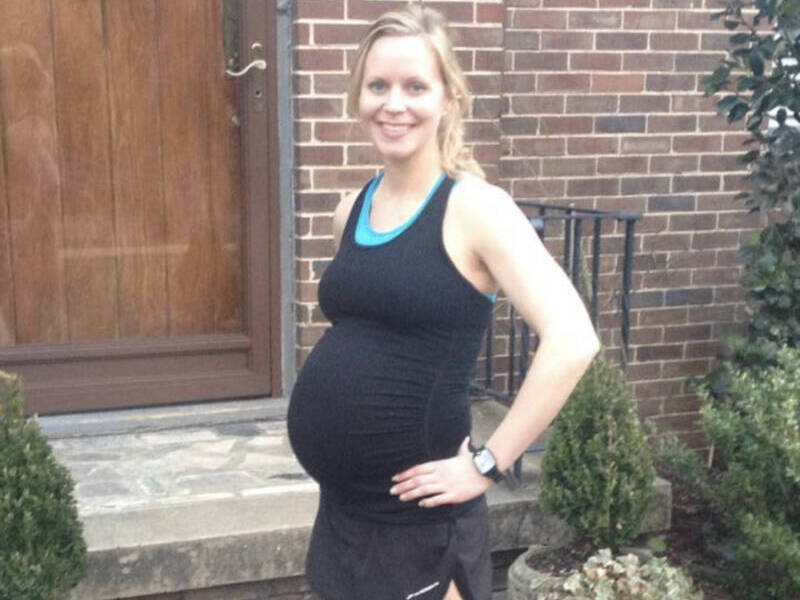Is Running Safe While Pregnant? Your Complete Guide
Is running safe while pregnant? Unless you have an at-risk pregnancy, running while pregnant is safe! It is not advised to start running during pregnancy but for runners who became pregnant, running is good for you and your baby!

I ran through both of my pregnancies and have coached dozens of pregnant runners, including those who completed marathons–even their first marathon and even a Boston Marathon qualifier.
However, while running while pregnant is safe–there are considerations for your comfort, health, the health of your baby, and your training. I am sharing information below from my experience as a pregnant runner, certified running coach who coaches pregnant runners, and from other experts and mother runners. My hope is that this guide to running while pregnant gives you all the information you need to safely run while pregnant and ease any worries you may have.
Of course, it’s always smart to talk to your doctor about your plans to run while pregnant as I am not a doctor. Now, let’s go!
Table of contents
- Is running safe while pregnant?
- General Pregnant Running Tips
- Key Run Training Tips for Pregnancy
- 10 Pregnant Running Tips from Experts
- 1. Talk to your doctor
- 2. Listen to your body
- 3. Be prepared for pit stops
- 4. Get a maternity support belt
- 5. Manage morning sickness
- 6. Eat right and drink often
- 7. Find slower running buddies
- 8. Take naps
- 9. Raid your partner’s closet
- 10. Give yourself grace
- At what point in pregnancy should I stop running?
- What other exercises can you do if running gets uncomfortable?
Is running safe while pregnant?
Running while pregnant is safe, but with one important caveat: It is safe so long as you were regularly running previous to conception and have no health risks.
If you are considering taking up running now that you are pregnant, most experts recommend that you wait until after the baby (and the postpartum recovery period) to lace up those running shoes.
Even if you have been running regularly before pregnancy, this time is not one to push your limits or chase for personal bests. Instead, focus on the joys of the sport, the stress relief it provides, and the health benefits it brings to you and your baby.
General Pregnant Running Tips
- Wear a supportive sports bra, supportive shoes and tie your shoelaces tightly
- Always take 5 minutes to warm-up and cool down
- Run on level surfaces
- Stay hydrated and drink plenty of electrolytes
- Eat every couple of hours
- Fuel during runs over 60 minutes and never run on an empty stomach. Get a list of the best energy gels for pregnancy here.
- Give yourself plenty of time to recover
- Wear a belly band if needed for extra support
Key Run Training Tips for Pregnancy
Run a big base phase: Pregnant runners looking to stay fit or who want to race while pregnant can run a high volume, low-intensity miles which will help increase endurance. It’s important to note that recovery takes longer in between training sessions and races for pregnant runners.
Scale workouts: Intensity will naturally be higher for pregnant runners. Therefore, it’s important to scale effort for workouts. For example, tempo runs may be done at a steady state pace instead of threshold. Intervals may be done at a threshold pace rather than VO2 Max.
Volume will also be reduced and recovery intervals will be increased. Effort should not go beyond an 8/10 on the rate of perceived exertion scale (or 75 percent of your max heart rate). Avoid all-out strenuous exercise.
Incorporate hills: Hills are a wonderful training tool for pregnant runners because there is less impact. Therefore, it’s aerobically challenging but not overall taxing on the body. Some pregnant runners may get breathless doing hills. If you do, scale them back or not run them as no session should be more than moderately hard.
An important note about incorporating speed work when pregnant
Speed work may not be a good idea for every pregnant running mama. Remove speed work from your weekly running routine if you:
- You are struggling to recover between sessions
- Have any leakage or pelvic floor discomfort (including round ligament pain)
- Did not do hard workouts before pregnancy
- Are experiencing pain in your knees, feet, back, etc.
- You have a high demand for energy or time on your feet during the day
- Your energy starts to feel low
10 Pregnant Running Tips from Experts
Here are ten practical tips to run pregnant from experts and mother runners who have done it to keep you safe and comfortable.
1. Talk to your doctor
Every pregnancy is different. You may have complications or feel different than other moms who run. Whatever you do, make sure you tell your doctor that you’re continuing to run so that they can monitor how that’s going for you and the baby. Also, ask them to set guidelines—sharing your running history so they know what your body is used to doing.
2. Listen to your body
If something doesn’t feel good or feels strange. Stop doing it. And, then share with your doctor what’s going on. This is not a time to do speedwork and extra long runs. The comfort zone is the place to be when growing a human. Keep it easy. You’ll get it back.
3. Be prepared for pit stops
I cannot tell you how many times I would have to pee (or at least felt like I had to pee) on a 4-mile run. I got really good at pretending like I was tying my shoe but instead was…well, you get the picture. Humility goes out of the door in the name of comfort. If this isn’t something you want to do, plan to run near public bathrooms.
4. Get a maternity support belt
When the extra weight in my tummy got uncomfortable, I invested in the Gabriella Maternity Light Support Belt. Another fantastic one which a lot of professional runners use is ReCORE’s Fitsplint. A belt worked wonders in taking the pressure off so I could still log slow miles throughout my pregnancies. Also, this is common sense—but make sure you have good supportive shoes.
5. Manage morning sickness
If you’re dealing with morning sickness and still trying to run—take heart. Fellow pregnant runners said sipping electrolytes like these on their runs helped calm their queasy stomachs. Cutting mileage (starting by 10 percent) may also ease symptoms.
6. Eat right and drink often
You need to eat about 300-500 more calories a day in your second and third trimesters. Aim to eat a mid-morning and late-afternoon snack, and every meal should include healthy fats, carbs, and protein. (And, take your prenatal vitamins!).
Also, hydration is key. Know your sweat rate at different temperatures, suggests registered dietitian Amy Stephens, who coaches elite runners. Click here for a sweat rate calculator.
“During pregnancy and lactation, your fluid shifts will be higher. This is because your body is holding more fluids and your body creates more heat so the shifts are greater. Therefore, electrolytes will be helpful to restore higher fluid losses,” she explains.
- If you sweat a lot (>1 pound per hour), add a salty snack before or after your workout. Pickles, pretzels or saltines are great.
- Start with 16 oz fluids at least one hour before exercise and drink 4-6 oz every 15-30 min during the workout. You will need more if it’s warmer or less if it’s cooler.
- Prehydrate before longer runs by drinking extra fluids the night before and continue after the run.
- If you’re worried about having to make pit stops, go before your run and plan a route where there are places to go to the bathroom.
7. Find slower running buddies
If you’re keeping your heart rate at 140 or below (or at a conversational pace), you may not be able to run with the same friends you ran before you became pregnant. Find people who will run at an easier pace.
Or, if you are running with the same people, run with them on their easy days and let them know your limits. Speak up if the pace gets too fast.
8. Take naps
Your body is working overtime growing a human and chances are your sleep is interrupted by discomfort and having to pee several times a night. Heed those heavy eyes and try to lay down whenever you have the opportunity to rest.
9. Raid your partner’s closet
This is kind of genius—if you don’t want to spend a lot of money on maternity running clothes, consider raiding your partner’s closet for workout shirts you can wear while your tummy is housing a human.
10. Give yourself grace
Your body is freaking amazing. It’s built to run and it’s built to have babies. It’s going to be changing and doing what it needs to bring a human into the world. Don’t stress about gaining weight or missing runs. It’s adapting to this major change and it will adapt again after you have your precious baby.
At what point in pregnancy should I stop running?
A pregnant woman should stop running if continuing to do so feels uncomfortable, she has a medical concern and is directed to stop by her doctor, or if she has any of the following pain or issues:
- Significant leakage
- Pelvic floor discomfort
- Vaginal bleeding
- Water breaking
- Placenta previa
- Struggling to recover between sessions
- Dizziness or headache
- Chest pain
- Trouble catching breath or breathing
- Pain in the knees, feet, or back
- Swollen or painful calves
- Heaviness in the pubic area
- Pelvic pain
- Balance difficulty or weak muscles
In most cases, your body will tell you that it is time to stop running due to discomfort or pain. Now is the time to develop that awareness and listen to whatever your body is telling you. You may naturally notice that as you continue running in the second or third trimester of pregnancy your body naturally begins to slow down as your bump grows or pregnancy symptoms change.
Personally, sciatic pain during my second pregnancy in the third trimester told me it was time to call it quits for a while so I did barre instead.
What other exercises can you do if running gets uncomfortable?
If running does become too uncomfortable for you or if your doctor advises you against running but gives you clearance to continue with low-impact exercise, here are a few other safe pregnancy workouts:
- Walking
- Swimming
- Elliptical
- Stationary cycling
- Yoga
- Barre
- Weight training
It’s not uncommon to not feel up for running while pregnant–so if you don’t feel comfortable doing it, don’t force it. This is not a failure–this is you listening to your body! Running will be there for you after you have your beautiful baby. Check out my postpartum running guide to help you when that time comes, or check out my run coaching if you need support!






